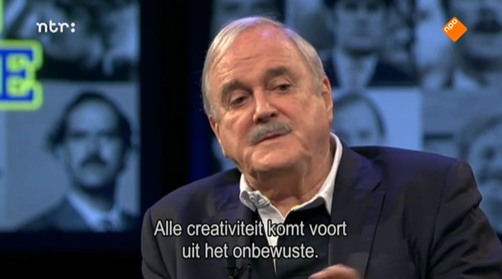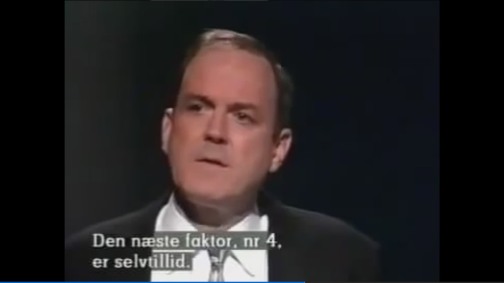Today is a great day to publish an insight on creativity.
by jiookrednav
Well I started to get interested in creativity about thirty years ago, because I went to a conference at Cambridge and I started reading the research and I started comparing it with my own experience and I got very, very interested in it and I also got interested in the fact, that basically once you’ve established one or two principles, that’s all you can say about it, because to sum up something I sometimes take three hours to say:
All creativity comes from the unconscious. If creativity came from logic and intelligence, then all the logical and intelligent people could do it. But they can’t. It all boils down to getting to a playful and relaxed frame of mind. Most of it has to do with relaxation, because unless you’re relaxed you can’t hear the promptings from the unconscious.
Nobody ever had a bright idea when they were attacking a machine-gun-nest. You see what I mean? If you’re occupied with activity -and that is one of the reasons why there’s so little creativity at the moment, because nobody gets any peace any more, because these damn things are ringing all the time, and beep there and you know. You sit down, another e-mail comes in. It’s absolutely poison, because interruptions and anxiety will kill any kind of creativity.
You have to get in an atmosphere where you’re a little bit in a cocoon of you’re own, you close the door or you go sit in the park and you just stay quiet and for 20 minutes nothing happens, because you can only think of the things you ought to be doing: You know, people you forgot to telephone…, so you have to have a little notebook and you write those down and after 20 minutes, the mind starts to calm down, just as it does in meditation, it’s almost an identical process. And then if you start thinking about the subject, not too hard, you don’t want to get tense, play with the thought, and you get little ideas start popping up, but if you’re mind is full of, zoom, zoom beep, beep, you’ll never hear those little ideas, it’ll be drowned out you see what I mean?
This remarkable insight was explained by John Cleese in this interview, starting at about 52 minutes: http://www.npo.nl/college-tour-special-john-cleese/25-12-2014/VPWON_1234760
And here’s some more from Cleese on this blog:
As well as identifying that ideas and breakthroughs percolate in the deep recesses of our brain, Cleese talked about some of the key, practical traits of truly creative people. In doing so he told a story of Brian Bates, a psychology professor at Sussex University. Intrigued by how the creative mind works, Bates chose to study the work practices of architects, because the profession required the combination of two brains in the creation of beautifully groundbreaking yet structurally sound buildings.
“He did a very simple test. He asked various architects to name who, in their opinion, were the most creative architects in the field. He then asked those creative architects to tell him what they do from the moment they wake up to the moment they go to bed. He then went to the uncreative architects—without perhaps explaining that’s why he was talking to them—and asked them the same thing. Then he compared the two. He discovered two differences, and neither was to do with intelligence.”
“The first thing he discovered is that the creative architects knew how to play. They could get immersed in a problem. It was almost childlike, like when a child gets utterly absorbed in a problem. The second thing was that they deferred making decisions as long as they could. This is surprising.”
“If you have a decision to make, what is the single most important question to ask yourself? I believe it’s ‘when does this decision have to be made’? When most of us have a problem that’s a little bit unresolved, we’re a little bit uncomfortable. We want to resolve it. The creative architects had this tolerance for this discomfort we all feel when we leave things unresolved.”
“Why would those two things be importance? The playfulness is because in that moment of childlike play, you’re much more in touch with your unconscious. The second is that when you defer decisions as long as possible, it’s giving your unconscious the maximum amount of time to come up with something.”
Summing it up, he narrows it down to 5 Lessons in this lecture (transcript here). “Creativity is not a talent, it’s a way of operating”:
- Space (“You can’t become playful, and therefore creative, if you’re under your usual pressures.”)
- Time (“It’s not enough to create space; you have to create your space for a specific period of time.”)
- Time (“Giving your mind as long as possible to come up with something original,” and learning to tolerate the discomfort of pondering time and indecision.)
- Confidence (“Nothing will stop you being creative so effectively as the fear of making a mistake.”)
- Humor (“The main evolutionary significance of humor is that it gets us from the closed mode to the open mode quicker than anything else.”)


